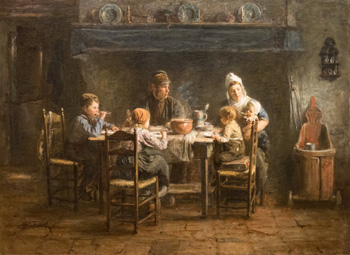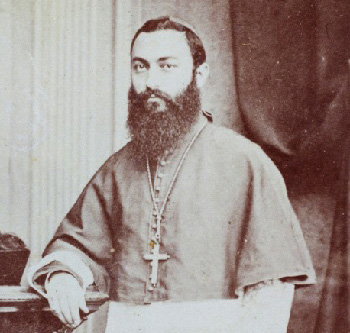Organic Society
 |
 |
 |
 |
 |
 |
 |
Nobility & Sanctity
Insofar as a man overcomes the lower sphere of the pleasures of the senses, he gradually ascends to higher spheres. It is a true asceticism that creates more propitious conditions for sanctity.
This does not necessarily mean that souls of a lower social sphere do not have access to high degrees of virtue. To think in this way would be a simplification and wrong. A man of a lower social condition has other opportunities that elevate his soul as much as an aristocrat is elevated by refined things.
 Imagine a woodcutter, the father of a large family, who after a day of hard work returns home to find a hearty dinner prepared especially for him. He then takes his rest looking out of a window surrounded by his entire family who honor him with great respect.
Imagine a woodcutter, the father of a large family, who after a day of hard work returns home to find a hearty dinner prepared especially for him. He then takes his rest looking out of a window surrounded by his entire family who honor him with great respect.
This woodcutter has the modest taste of his small, direct and patriarchal lordship whose simplicity – without cultural and symbolic complications – gives him the opportunity to enjoy the superior values of soul linked to his social condition. This may elevate his soul more than a prince who is not as generous as the woodcutter and loves God less than he does.
This also does not mean that the doors of sanctity are closed or even less widely open for a person of a lower condition. The grace of God gives to the man of a very modest condition the possibility to see high aspects of reality and to love them.
A magnificent example of this is Pierre Toussaint, a black slave of Haiti who gave heroic proofs of his devotion to the Mistress of the household, even when she fell into misfortune.
Is nobility synonymous with sanctity?
Nobility is not to be confused with sanctity, but also it is not dissociated from it.
In the human person there is a way by which he can achieve the highest sanctity, even though he lacks in his personality all the refinements that sanctity can produce during a long period of time in a family.
 For example, let us take a man who I believe was a saint: Dom Vital, a Brazilian Capuchin who served as Bishop of Olinda from 1871 to his death. He could have been from the landed nobility; I am not sure if he was, but he could not pass for a European aristocrat. However, after some generations with persons as holy as Dom Vital in a family, its members would certainly pass as European aristocrats.
For example, let us take a man who I believe was a saint: Dom Vital, a Brazilian Capuchin who served as Bishop of Olinda from 1871 to his death. He could have been from the landed nobility; I am not sure if he was, but he could not pass for a European aristocrat. However, after some generations with persons as holy as Dom Vital in a family, its members would certainly pass as European aristocrats.
This is different from the manual worker who participates in the Palio de Siena, who normally would not be an aristocrat, although those workers generated a festival highly akin to nobility, without being noble.
Let us imagine a noble and virtuous lady who is walking through a garden and picks a flower. She fixes that flower on her dress by means of a brooch and continues on her stroll. That gesture can have a delicacy that is a reflection of a sanctity diffused in society, which can be the reflection of saints who lived in that society. Above all it can be the reflection of the Church who is Sanctity in itself.
On the other hand, we can imagine St. Anna Maria Taigi, who worked as a domestic servant in Rome, picking a flower. Her gesture can have nothing of nobility in it. How can this be, since she is more saintly than the other fine lady taking a stroll?
It is because she does not have the hereditary effects of sanctity, while the former lady, although not being a saint, had those effects diffused in her family or in her social ambience. Sanctity models the character, but the character does not immediately model the way of being. Sanctity models those in whom it lives in a state of tradition even if those persons do not necessarily possess it.

 In those who are noble, sanctity tends to make them nobler. In those who are not noble, sanctity does not necessarily tend to make them nobles. But it favors other reflections of sanctity, leading the persons to do what is proper to their condition of life in an excellent way.
In those who are noble, sanctity tends to make them nobler. In those who are not noble, sanctity does not necessarily tend to make them nobles. But it favors other reflections of sanctity, leading the persons to do what is proper to their condition of life in an excellent way.
The bourgeois dignity, for example, can be magnificent in a person of this class. Or in the nobility, for example, a holy countess does not take the airs of a queen, but she can be a super-countess. The norm of sanctity is to cause a countess to be ever more excellent in that family and ambience. If this excellent way of being and acting is maintained, then it would be normal for it to generate a princely house.
A plebeian who had a grandparent saint certainly has in his heritage an invitation to elevate himself. But to elevate himself is not to become a noble. Sanctity is not a necessary effect that produces nobles, although it can occasionally produce them.
Sanctity necessarily elevates the individual in his condition, but not necessarily to a higher level of society.
A noble society is not one where all tend to become princes, but rather one that produces excellent persons in each genre and social class. From these classes once in a while some bubbles rise that ascend from a lower class to the nobility, but they are exceptions.
Sometimes Divine Providence asks a noble to renounce his high condition and enter a lower one to fight against some temptation. Let us suppose that a person likes wine very much and can discern the spiritual and psychological aspects of wine. David says that “wine cheers the heart of man” (Ps 103:15)
But the wine with its seduction may make that man forget its relation to God and he can abuse it, becoming a worldly person addicted to drink disproportionally. So to avoid falling into this vice, the noble renounces his situation in life and becomes, for example, a voluntary beggar.
But a noble who reduces himself to a plebeian and assumes mendicancy moved by the idea that God is worth more than anything else, becomes more dignified than if he were to remain in his natural condition of noble. His supreme abnegation made him still nobler. It is very beautiful!
Regarding excellent gifts of nature, we see that God wishes some to sanctify themselves by using those gifts, and others He asks to renounce them to achieve sanctity. The history of the Saints is filled with examples of both cases.
The crosses will come for each person. For some they will come in the palace of the Ministry of State were the person is surrounded by a luxurious ambience. For others they will come in a cottage or a beggar’s shack.
The designs of God make souls shine in one way or another, giving us a magnificent lesson on how to use the goods of earth, at times by accepting them and making them shine, at other times by renouncing them.
What is the more beautiful way? It is to do the will of God.
So, we understand that a king can be a saint shining in his court, and because he lived in the splendor of his court. And another can be a saint by renouncing that magnificence, as, for example, the daughter of King Louis XV, Louise-Marie of France, who renounced the court life and became a Carmelite.
However, this type of change of social class that God sometimes asks is exceptional. Habitually the person is called to sanctify himself in the condition in which he was born. Poverty propitiates the soul to certain beauties, lightness and candidness that richness, high culture and politeness, and the elevated philosophical or theological formation do not give. Nonetheless, in turn, these latter goods nourish the soul with things that the poverty does not give.
Posted November 27, 2024

This does not necessarily mean that souls of a lower social sphere do not have access to high degrees of virtue. To think in this way would be a simplification and wrong. A man of a lower social condition has other opportunities that elevate his soul as much as an aristocrat is elevated by refined things.

A modest family live surrounded with respect creates conditions to cultivate virtue
This woodcutter has the modest taste of his small, direct and patriarchal lordship whose simplicity – without cultural and symbolic complications – gives him the opportunity to enjoy the superior values of soul linked to his social condition. This may elevate his soul more than a prince who is not as generous as the woodcutter and loves God less than he does.
This also does not mean that the doors of sanctity are closed or even less widely open for a person of a lower condition. The grace of God gives to the man of a very modest condition the possibility to see high aspects of reality and to love them.
A magnificent example of this is Pierre Toussaint, a black slave of Haiti who gave heroic proofs of his devotion to the Mistress of the household, even when she fell into misfortune.
Is nobility synonymous with sanctity?
Nobility is not to be confused with sanctity, but also it is not dissociated from it.
In the human person there is a way by which he can achieve the highest sanctity, even though he lacks in his personality all the refinements that sanctity can produce during a long period of time in a family.

Dom Vital, Bishop of Olinda, Brazil
This is different from the manual worker who participates in the Palio de Siena, who normally would not be an aristocrat, although those workers generated a festival highly akin to nobility, without being noble.
Let us imagine a noble and virtuous lady who is walking through a garden and picks a flower. She fixes that flower on her dress by means of a brooch and continues on her stroll. That gesture can have a delicacy that is a reflection of a sanctity diffused in society, which can be the reflection of saints who lived in that society. Above all it can be the reflection of the Church who is Sanctity in itself.
On the other hand, we can imagine St. Anna Maria Taigi, who worked as a domestic servant in Rome, picking a flower. Her gesture can have nothing of nobility in it. How can this be, since she is more saintly than the other fine lady taking a stroll?
It is because she does not have the hereditary effects of sanctity, while the former lady, although not being a saint, had those effects diffused in her family or in her social ambience. Sanctity models the character, but the character does not immediately model the way of being. Sanctity models those in whom it lives in a state of tradition even if those persons do not necessarily possess it.

The simple act of flower picking can – or cannot – reveal hereditary sanctity in a family

The bourgeois dignity, for example, can be magnificent in a person of this class. Or in the nobility, for example, a holy countess does not take the airs of a queen, but she can be a super-countess. The norm of sanctity is to cause a countess to be ever more excellent in that family and ambience. If this excellent way of being and acting is maintained, then it would be normal for it to generate a princely house.
A plebeian who had a grandparent saint certainly has in his heritage an invitation to elevate himself. But to elevate himself is not to become a noble. Sanctity is not a necessary effect that produces nobles, although it can occasionally produce them.
Sanctity necessarily elevates the individual in his condition, but not necessarily to a higher level of society.
A noble society is not one where all tend to become princes, but rather one that produces excellent persons in each genre and social class. From these classes once in a while some bubbles rise that ascend from a lower class to the nobility, but they are exceptions.
Sometimes Divine Providence asks a noble to renounce his high condition and enter a lower one to fight against some temptation. Let us suppose that a person likes wine very much and can discern the spiritual and psychological aspects of wine. David says that “wine cheers the heart of man” (Ps 103:15)
But the wine with its seduction may make that man forget its relation to God and he can abuse it, becoming a worldly person addicted to drink disproportionally. So to avoid falling into this vice, the noble renounces his situation in life and becomes, for example, a voluntary beggar.
But a noble who reduces himself to a plebeian and assumes mendicancy moved by the idea that God is worth more than anything else, becomes more dignified than if he were to remain in his natural condition of noble. His supreme abnegation made him still nobler. It is very beautiful!
Regarding excellent gifts of nature, we see that God wishes some to sanctify themselves by using those gifts, and others He asks to renounce them to achieve sanctity. The history of the Saints is filled with examples of both cases.
The crosses will come for each person. For some they will come in the palace of the Ministry of State were the person is surrounded by a luxurious ambience. For others they will come in a cottage or a beggar’s shack.
The designs of God make souls shine in one way or another, giving us a magnificent lesson on how to use the goods of earth, at times by accepting them and making them shine, at other times by renouncing them.
What is the more beautiful way? It is to do the will of God.
So, we understand that a king can be a saint shining in his court, and because he lived in the splendor of his court. And another can be a saint by renouncing that magnificence, as, for example, the daughter of King Louis XV, Louise-Marie of France, who renounced the court life and became a Carmelite.
However, this type of change of social class that God sometimes asks is exceptional. Habitually the person is called to sanctify himself in the condition in which he was born. Poverty propitiates the soul to certain beauties, lightness and candidness that richness, high culture and politeness, and the elevated philosophical or theological formation do not give. Nonetheless, in turn, these latter goods nourish the soul with things that the poverty does not give.
Posted November 27, 2024

Organic Society was a theme dear to the late Prof. Plinio Corrêa de Oliveira. He addressed this topic on countless occasions during his life - at times in lectures for the formation of his disciples, at times in meetings with friends who gathered to study the social aspects and history of Christendom, at times just in passing.
Prof. Plinio
Atila S. Guimarães selected excerpts of these lectures and conversations from the transcripts of tapes and his own personal notes. He translated and adapted them into articles for the TIA website. In these texts fidelity to the original ideas and words is kept as much as possible.
______________________
______________________






